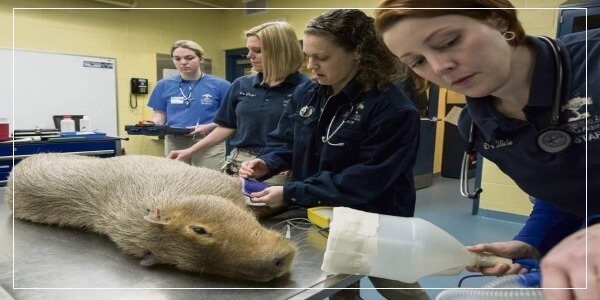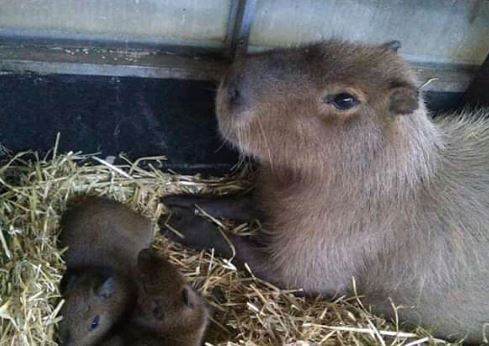Is it healthy to kiss a pet capybara?
You love your pet capybara, but is it healthy to kiss them? You might want to kiss your Capybara because you find them cute, or maybe you like the way their lips taste. But there are several reasons not to kiss your pet Capybara. First of all, capybaras are rodents and carry several diseases that can be transmitted from one animal to another through saliva. For example, hantavirus is a disease spread by rodents that cause flu-like symptoms in humans that can lead to death if left untreated. In addition to hantavirus, Capybaras also carry lice and fleas on their fur which could get breathed into another person’s lungs causing illness as well!
You love kissing your pet capybara. But is it healthy?
You love kissing your pet capybara. But is it healthy?
Capybaras are rodents and can carry diseases and parasites. They can also transmit hantavirus, which is fatal in 1/3 of cases! This disease is transmitted through saliva, so if you kiss your pet capybara, you’re at risk of getting it. Hantavirus is transmitted through contact with the feces or urine of an infected animal, but it’s also possible to inhale airborne particles from a rodent’s saliva into your lungs by inhaling while the animal licks itself or brushes up against you or something else that could transfer its saliva onto another surface (like a person).
So what should you do? Should we stop kissing our pets altogether? Not necessarily—hantavirus is rare in humans and only appears in about 40-70 cases per year nationwide (including all types). If you’ve been around rodents before without getting sick and don’t have any unexplained symptoms like fever or muscle aches after being exposed to rodent droppings/urine/saliva on yourself or your belongings, then there shouldn’t be any reason for concern; however, if someone has been diagnosed with hantavirus infection before they may want to avoid future exposure since symptoms can vary widely between individuals depending on how much virus they were exposed too as well as their overall health status prior
You might kiss your pet Capybara to show affection or because you like the way they taste.
You might kiss your pet Capybara to show affection or because you like the way they taste. Kissing is not a good idea for several reasons:
- It can make you sick. Your mouth contains bacteria that could cause an infection if transferred to your pet Capybara’s mouth when you kiss it.
- It can spread diseases, parasites, and lice to your pet Capybara.
But capybaras transmit a host of diseases and parasites that can be harmful to people.
You may have heard that kissing your capybara is a great way to show it love and affection. But before you go sticking your tongue in its mouth, it’s important to know that capybaras can transmit a host of diseases and parasites that are harmful to people.
For example, according to the Centers for Disease Control, capybaras can carry hantavirus which causes an acute respiratory disease that is fatal in about half of cases. While this virus is most often found in rodents like deer mice and white-footed mice (which are common throughout North America), you should still be cautious when interacting with any animal—especially one with sharp teeth!
Capybara saliva also has been found to contain Bartonella bacilliformis bacteria—a microbe common among domesticated animals like dogs but rarely seen at all among humans (and certainly not transmitted through kissing). As far as lice and flea infestations go: don’t worry too much about them if you’re just casually petting your capybara on occasion; however if you’re planning on having regular physical contact with your little pet friend then treat yourself to these critters first!
Capybaras are rodents, and several species of rodents carry hantavirus. It’s a disease that can be transmitted by saliva, so if you have an open wound on your face, you could get sick from kissing your pet Capybara.
Hantavirus is a virus that can be transmitted by saliva, so if you have an open wound on your face, you could get sick from kissing your pet Capybara.
Symptoms include fever and headache, muscle aches, and coughing. In some cases, hantavirus can lead to death.
The Centers for Disease Control says around one in three people with hantavirus will die from it.
The CDC also says that around one in three people with hantavirus will die. Hantavirus is a serious disease, and you should not kiss your pet capybara.
It’s important to note that even though there are no known cases of humans contracting hantavirus from kissing animals (or other humans), it can be transmitted through saliva. If you’re going to kiss your pet capybara, make sure you wash your hands afterward and don’t do it again for at least 10 days.
Another reason not to kiss your pet Capybara
Another reason not to kiss your pet Capybara is that you don’t know where its mouth has been. Animals have raw urges that humans don’t, and you don’t want them licking their private parts and then licking your face.
A capybara’s basic nature is to lick themselves all day long, which means they’re constantly spreading lice and fleas in the air around them. You’ll also likely find a parasite or two on their fur during the course of grooming—and you certainly won’t want them licking their private parts and then yours!
Capybaras also carry lice and fleas on their fur, which can get spread through the air when they shake their body. If a person breathes in the lice or fleas, they can get sick too.
Capybaras also carry lice and fleas on their fur, which can get spread through the air when they shake their body. If a person breathes in the lice or fleas, they can get sick too. This is why it’s important not to kiss your pet capybara if you have open sores in your mouth or nose. If you have any kind of breathing problems like asthma or allergies, it’s even more important to avoid a kiss from Fido—you could end up with an infection that causes a nasty cough!
If you’re still dying for some cuddles with your furry friend, try holding him tight instead of kissing him. But be aware that capybaras are rodents (which means they’re related to mice and rats), so there may be dangers lurking around here as well: several species carry hantavirus!
Kissing any animal is risky.
Kissing any animal is a risky business, especially when you haven’t looked into what kinds of illnesses they could be carrying. Capybaras are particularly at risk for transmitting diseases because they are the only species in their family that can survive outside of water. They also travel between countries, making it easier for them to spread illness.
So is it okay to kiss a capybara? Not really—even if you don’t mind the possibility that the animal has lice or fleas on its body, there’s no way to know where its mouth has been. The most common way pet capybaras get sick is when they eat garbage food left out by careless owners who don’t know any better than to leave dangerous things lying around where animals like capybaras might eat them (ahem).
Conclusion
The best way to show your pet capybara you love them is by giving them plenty of attention and by treating them well. You can kiss them, just make sure it’s not a regular occurrence, and never let anyone else do it either. Make sure that everyone who comes into contact with your Capybara understands how important it is to be careful around animals so they don’t get sick or spread diseases.

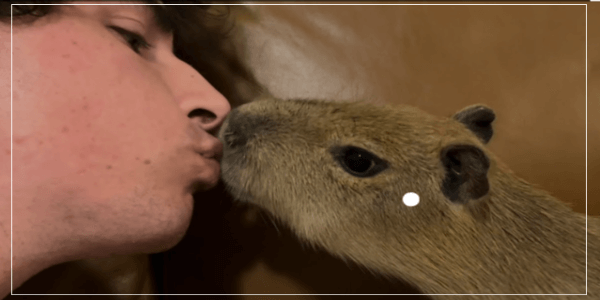
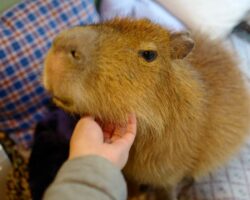
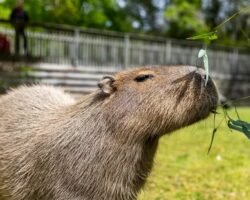
![Capybara Meat And Its Culinary Uses - [Every You Should Know] Capybara Meat & Culinary Uses](https://capybaratips.com/wp-content/uploads/2023/03/Capybara-meat-250x200.webp)


